![068_130816-(ZF-5221-87751-1-008)[1]](https://helenetstelian.com/wp-content/uploads/2015/07/068_130816-ZF-5221-87751-1-0081-300x200.jpg) When she finally found her life partner in her 40s, Sally was able to realize her deep yearning for a child of her own. She recounts how donor-egg IVF gave her a beautiful, healthy son—and writes about her experience as a late-in-life mom on her blog.
When she finally found her life partner in her 40s, Sally was able to realize her deep yearning for a child of her own. She recounts how donor-egg IVF gave her a beautiful, healthy son—and writes about her experience as a late-in-life mom on her blog.
Tell us a little about your life before your next act…
Before my next act, I was a happy, single, 45-year-old woman living in New York City. I had, and still have, an amazing circle of friends who are more like family to me. I was working as a technical writer in a software development company. All-in-all, I was content. I had had several long-term relationships in my 20s and 30s which, fortunately, never led to marriage. I had also considered single motherhood in my later 30s and 40s since marriage didn’t seem likely to happen, but I realized I wasn’t cut out for parenting without a partner. I have incredible admiration and respect for several of my friends who are single parents, but I knew I had neither the stamina nor the finances to attempt it myself.
I was a happy person with a really fun-filled single life. I enjoyed and appreciated that I had no responsibilities except to myself. I watched friends deal with the stresses of marriage, work, and family and was truly cognizant of the fact that, although sometimes I was lonely, along with marriage and family comes this enormous amount of potential worry and stress.
Except, every once in a while, I’d see someone with a child and burst into tears. I never considered myself a baby person and I never had “baby fever,” but the thought that I’d never get to experience it for myself was the one regret I thought I’d have to learn to live with.
I went as far as to pre-enroll in NYU’s IVF program in late 2001, but I hurt my back very badly in September of that year and had to cancel my appointment. It took me almost three years to fully recover from this back injury and from its consequences: weight gain and a depleted bank account. Once I could move again, I slowly started strengthening my core and lifting small hand weights until over the course of about two years, I regained my strength and felt fitter than I had in ages.
At the end of the summer of 2004, I was invited to the U.S. Open Tennis tournament on a Sunday afternoon by my dear friend, Lisa. She introduced me to her college roommate, who introduced me to her work colleague, Dave. As we shook hands, I thought, “Wow, I’m going to marry him.” I didn’t know a single thing about him! Was he single? Was he straight? Was he interested? I knew he was employed, so what were the odds of meeting a straight, single, employed, and interested man at age 44? I didn’t know, and since I’ve always been horrible at math, I didn’t really care. I just knew we’d end up together, somehow. (For the record, he didn’t have the same reaction.)
Flash forward to 2008, Dave and I had been dating almost three years when one night, we went out for cocktails. We were living together, but we really hadn’t talked about a future. Dave had been married once before, so I wasn’t sure if he wanted to get married again. But in the back of my mind, I couldn’t help but think that maybe even at age 48, he wanted to become a father.
I ordered another mojito, drank it down, screwed up my courage, and asked him if he wanted children. He said yes and I nearly fainted. I had no idea if it was even possible, but I told him I had seriously considered IVF before we’d met. We decided that I’d talk to my doctor to discuss our options.
But first, we got engaged and married within 15 days in November 2008.

Our wedding
What is your next act?
My next act was becoming a first-time mom at 51. I don’t know what I can possibly say about how much I love being a mom. I’m grateful, I’m terrified, I’m exhausted, and I’m re-energized at the same time—and I never stop thinking about how very lucky we are to have a happy and healthy son.
How did you decide which way to go?
I think adoption is a beautiful thing and I did consider adoption as a single woman before I met Dave. But adopting at our age is not easy. There are so many younger couples (who have also been married longer than we have) that we felt our chances were almost non-existent, and remember, we weren’t getting any younger—we didn’t want to wait the five years or longer that it might take to adopt.
I also wanted to experience carrying a child, if possible. When I saw my regular gynecologist, she gave me a list of five IVF practices and told me that, at my age, no one would treat me unless I agreed to use donor eggs. Honestly, I had only the slightest idea what egg donation entailed. But I never had a doubt about moving forward. I wanted to at least try to have a baby. I’m the type of person who never wants to let go of a dream until every single last option has been explored.
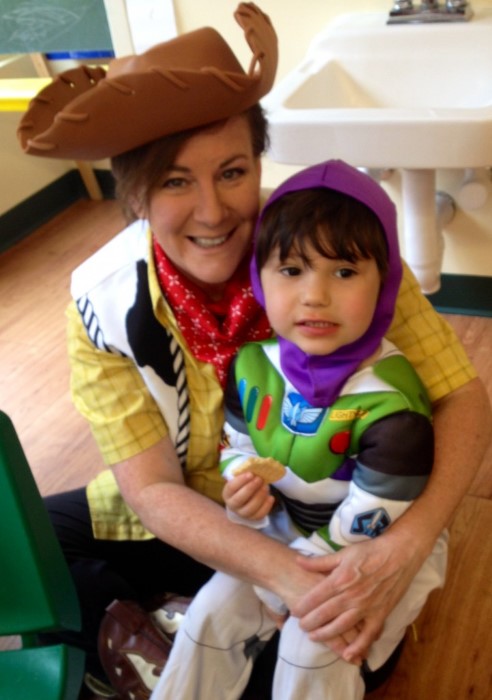
What challenges did you encounter?
The first challenge was finding a doctor who would accept me as a patient at my age. The first four on the list from my gynecologist hung up on me as soon as they heard that I was 48—it’s very difficult to get pregnant naturally later in life because a woman’s egg supply degrades with age, and you need to find a doctor who specializes in donor-egg IVF.
By the time I dialed the last number, The Center for Women’s Reproductive Care (CWRC) at Columbia, I was shaken and just terribly discouraged. Thankfully, CWRC did agree to consider me.
CWRC has a very long list of pre-qualifying tests to make sure you’re as physically healthy as can be for pregnancy, childbirth, and beyond. One of the very first tests I underwent was to evaluate whether my uterus was structurally normal. I know several women who had no problem conceiving through IVF, but who have uterine abnormalities that made carrying a pregnancy to full term impossible. Through this procedure, my doctors were able to see that I had no obvious problems that would result in a miscarriage.
I’ve been diagnosed with pre-diabetes, which I control with diet and exercise, but gestational diabetes is a risk factor in pregnancy at any age, so I had to have many diabetes-related blood tests before I could qualify.
I also had to undergo tests geared specifically to women over 45. For example, I had to have a cardiac treadmill test to evaluate my heart and blood pressure under stress. The bottom line, and one of the reasons I highly recommend CWRC, is that they screen you for any factors that might prevent a healthy delivery rather than just taking money from women who have no real chance of delivering a baby.
Dealing with our insurance company was another challenge. They covered infertility treatment, at least the diagnosis and routine testing involved, but only if pre-authorized. When I called, I was told that I would have to “try for at least one year on my own” before my tests would be covered. Seriously, at 48, we should wait ANOTHER year for some wild miracle to happen. I hung up, waited about 10 minutes, called back, and got someone else on the phone who gave me a different answer.
The next big challenge was coming up with about $30K upfront for the IVF treatment. We had our initial consultation in July of 2008, and then we decided to refinance our apartment. The housing market crashed and, although we were never in the same dire circumstances so many people found themselves in with under-water mortgages, our apartment did lose value and we were just barely able to scrape together enough money to proceed.
One other challenge was facing many difficult questions, starting with: Should we do this at all? Just because getting pregnant later in life is possible, is it fair to the child to have middle-aged parents who will be nearly 70 when he or she (or they!) graduate from high school? Would I be healthy enough to carry a child? Would my back give out the way it did in 2001? What about the risks involved in late-life pregnancy? I’m staunchly pro-choice, but I also never wanted to be faced with that particular choice, personally. What if we got pregnant with twins (or triplets or more!)? What if I couldn’t carry to term?
Another huge and unexpected challenge was how badly I was treated at work during my pregnancy. In fact, the stress inflicted was so horrible that I sought therapy for the first time in my life.
How did you resolve the many hard questions you asked yourself about having a child later in life?
I’m not sure the hard questions can ever truly be resolved and, if so, maybe only in retrospect. I mean, if we both live to be 100 in perfect health and then pass away quickly and quietly in each other’s arms when our son is 50 and a husband, father, and maybe grandfather himself already, then maybe we will die thinking, “Yeah, it was fair to our child.” But what parent has that luxury?
There are no guarantees. You can have children in your twenties and die young. We hope to give him the best life and support system we possibly can and raise him to understand that we are older than other parents. And there are a lot of older parents out there, more than ever before. In fact, in my high school graduating class of just above one hundred people, there are three sets of new parents. In the other two families, the fathers are my age and their partners are much younger. But by the time our children graduate from high school, having older parents might be pretty commonplace.
To anyone who questions our decision, I say, you have that right and you should only have children at the age you think appropriate. In fact, you should get married to the love of your life, who you’ll meet right on cue when you turn 25. You should have 2.5 children by age 30. You should never divorce or struggle with finances or health issues. You should live to 78 years of age, if you’re female, and a year or two less if male. Your life should go perfectly according to a script. However, if it doesn’t, you have options. Get back to me in your late 40s and let me know how it’s all going. I promise I won’t judge.
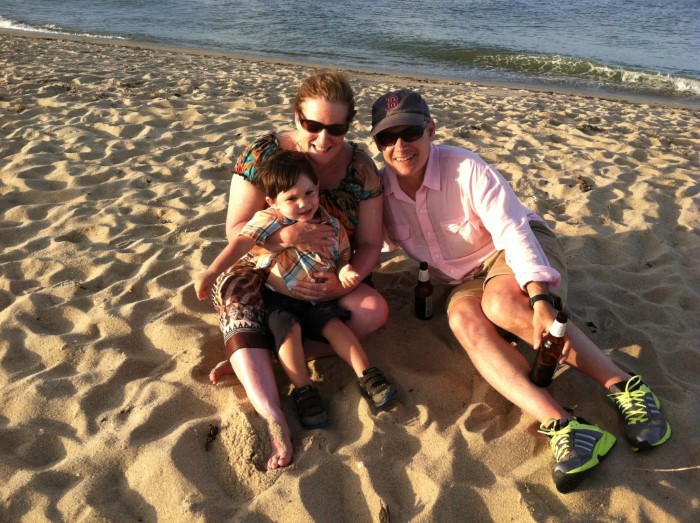
Were you nervous about using donor eggs?
Not after our initial consultation at CWRC. We learned that the donors are anonymous, at their request. These young women choose to participate in this program because once they donate, they are untraceable. Before they donate, they undergo extensive physical and psychological testing including very intrusive questions and complete medical, personal, and family histories dating back to their grandparents. We were told that if at any time during the psychological interviews, they use the term “my baby” to refer to what they are doing, they are eliminated from participation. These young women want to donate (for many reasons, including altruism) and then go on with their lives.
We did get to make a list of desirable traits in our donor. When a potential donor was found, our doctor got to see her picture to determine if she was a close physical match to me. We were allowed to review her file, which in addition to all her medical information, included things like her favorite movie, book, what she majored in in college, why she was donating, and direct quotes from her about her outlook on life. It was breathtaking, really. I cried several times during our session, especially when I heard that the reason she chose to donate was that she’d seen her aunt struggle with infertility and knew how devastating it could be. Egg-donor IVF wasn’t available to help her aunt but she wanted to help another infertile couple. I can’t express how much I admire and appreciate any young woman who chooses to be an egg donor. It is an arduous process, both emotionally and physically. They are heroes, in my eyes.
We are also anonymous. The donor will never know to whom her eggs were donated if we were successful, or even if her eggs fertilized. The records are not only sealed, they no longer exist. So even with a court order, our program could not produce any information about our donor to us or about us to the donor.
My son is mine in every way that’s important. I carried him. I’m his birth mother. I’ve loved him from the moment I knew he existed. That being said, we decided from the very start to be completely open and honest with him and everyone else about the fact that we used donor eggs. I sincerely feel that the more you try to keep something a “secret,” the more likely it will be revealed in a traumatic way. Years ago, people used to “pretend” with adopted children, and maybe some still do. But let’s face it, you can order a little kit on the Internet today and send in a DNA sample for testing. Is this really how I want my son to discover that we used an egg donor?
While the process through CWRC is anonymous, I understand that there is a registry for children conceived using sperm and egg donors. They can add their DNA to the registry to see if there are matches, either to donors or to other children conceived using the same donor. As soon as our son is able to truly understand the process, I will strongly encourage him, if he wants to, to add his name and genetic profile to the registry. If, at any time in the future, the donor has second thoughts and decides she’d like to know if my son exists, and she also chooses to add her genetic profile to the registry, then they can be matched and information shared. I can only think that this will add to the richness of my son’s life, and both Dave and I will welcome and facilitate whatever contact they may want to have.
How long did it take for you to become pregnant? Did you enjoy your pregnancy?
We succeeded on the very first and only try. It took three years in total from the first consultation at the clinic until our son was born, but the usual time, we were told, is four months from first appointment to first IVF cycle. We had a lot to work out before we could actually start the cycle, including getting married and refinancing our home to come up with the money.
Did I love being pregnant? NO! I hope you’re not looking for platitudes about how natural and wonderful being pregnant is. It sucks. And I had a very easy pregnancy. I didn’t have morning sickness at all. My blood sugar and blood pressure levels stayed in the acceptable range. I didn’t gain all that much weight. My back did start to bother me very badly at the end and I had sciatica for the last month, but I was on maternity leave by then, so I didn’t have to try to drag myself to work in pain.
I was also terrified the whole time. Very early on, I started bleeding and I was certain I had miscarried. It turned out to be fine, but I was nervous from that point on. I worried about my blood pressure and preeclampsia. I worried about almost everything, and I refused to leave the island of Manhattan from about 24 weeks on. I didn’t want to be more than 15 minutes away from my amazing high-risk OB and a state-of-the-art neonatal unit.
I had a medically necessary, scheduled C-section, and it was a beautiful experience. My only problem was that I had a reaction to the anesthesia, which caused me to shiver and shake for a couple of hours after the birth. I didn’t want to risk holding our baby and dropping him, but Dave was by my side the whole time and the moment our son was born, he held him next to me until I could.
I can’t describe how I felt the first time I saw him and heard him cry. It was the most profound and powerful emotion I’ve ever felt, and it was not just about the baby. It was about us, as a family.

How supportive were your family and friends?
Because we’re older, we decided not to tell our families right away. My mother is a retired nurse and I didn’t want to worry her unnecessarily. We also agreed not to talk about it too much with friends, but I have best friends who are more like sisters and I shared right away with them. Colleen, who has been my best friend since high school, was completely and totally supportive. And really all of them were, and are, immensely supportive.
We also had two friends offer to carry our baby for us, if it came to that. There are no words to express just how supportive that is. I’ll never forget their kindness.
I took an at-home pregnancy test nine days after the embryo transfer and it was positive! I woke Dave up and told him immediately, and then I told my two besties. My friends have been rocks! They were so happy for us and my son has the best group of aunties in the world. I waited until about 12 weeks to tell my mother. She was outwardly thrilled and yet, as a nurse, terrified for me. Dave’s family was joyous!
Tell us about your son…
He’s amazing! We are so fortunate. He is happy, healthy, and if I do say so myself, adorable. He just turned 4, and while I wouldn’t wish 2- and 3-year-olds on anyone, in general, we made it through with lots of help from our family, friends, and especially Kerri, my best friend’s daughter, who has been the biggest and best helper two parents could ever have.
He loves trains and learning about the solar system. He never stops singing and running. He’s in preschool and can be a little shy, but makes friends pretty easily and adjusts to almost every situation we’ve thrown at him. Dave and I sit down every night when he’s finally asleep, in the deafening silence, shake our heads and laugh, and agree that we are the luckiest people on earth. And then I knock wood.
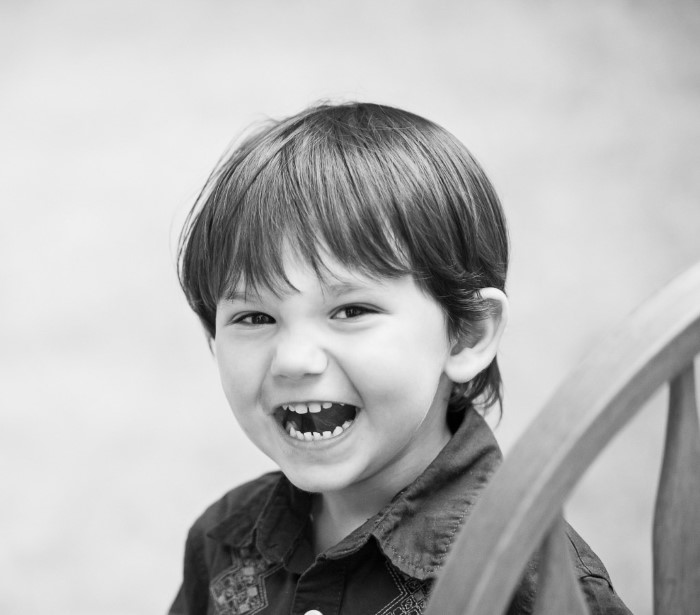
Do you feel you are a different parent than you would have been had you had a child earlier in your life? How do other parents respond to you and your son?
I would have been a horrible, awful parent earlier in my life. I was not ready at all until probably my mid-thirties. I never even thought about having children in my twenties except to know that I was not going to.
I’ve been called “grandma” on occasion by strangers. Not a lot, but it has happened. We live in New York City, where most people don’t really notice—or at least comment. New Yorkers tend to keep to themselves. On the playground, I think I’ve been mistaken for a nanny a few times. But I try not to take offense. I mean, I AM old enough to be a grandmother.
I’ve become friends with two mothers who were also a bit older when they had their sons, but both of them moved out of the NYC area. I miss them both every day. Dave and I realize that we have to put ourselves out there more and bond with other parents, but our circumstances have made it tougher. We just started at a new preschool and there are some lovely parents who are also trying to make connections for the sake of their kids. Some are even slightly older.
Did you go back to work or are you home with your son? Was that a difficult choice?
I stayed at home until he was four months old, and then went back to work. Dave stayed home for the next month. Then I decided I wanted to be at home with our son until he was at least three. There is no easy answer for me about which is more difficult. It’s equally difficult to be a working parent and a stay-at-home parent, just for different reasons. Childcare is ridiculously expensive, and I’m always anxious and nervous while he’s at daycare or preschool. But staying at home is just not right for him or us. I was getting impatient with him, and I know he’s much better off among other children during the day. I admire women who go back to work and manage to have big careers and be great moms, too. I also think women who stay at home and love it and make it work for their children are amazing, too.
Of course, I fully realize that I’m one of the very few lucky mothers who had a choice. Most parents don’t. It’s either work or starve, and in the case of all too many families out there, sometimes it’s work full time and still be too close to starving.
What kind of dad is Dave?
The best! He could write a book about it. In fact, he has written a couple of books—not about fatherhood, but there’s a thought. He’s much more patient than I am with the little guy. He’s every bit as involved and engaged in parenthood as I am. He took on an awful commute for almost two years so that we could sublet and move; this way, we could afford for me to stay at home. He’s the “good cop.” He has the stamina that I don’t. He had a wonderful role model in his father, and he’s done him proud.
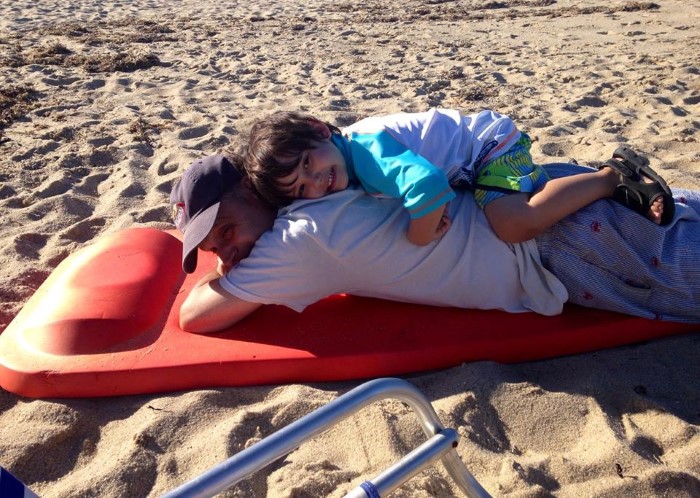
What did you learn about yourself through this process?
I’m terrified of doctors and medical procedures in general. During treatment, I had 112 doctor’s appointments, blood tests, check-ups, and sonograms. I think I probably had 50 blood draws! I was terrified at every step of the pre-IVF testing, which was extensive. I worried that I would fail a test and be rejected from the program.
I learned that I’m a lot stronger than I ever knew and that I’m a really “easy stick,” which is medical-speak for someone who has gigantic veins!
What advice do you have for those who wish to become first-time moms in midlife?
I guess it’s the same, simple, tried and true advice you’d get for any dream at any time of your life: Don’t give up. Fear of failure just means that you recognize the prize at the end is just that much more amazing.
If your dream is motherhood, find the best doctors you can and seek more than one opinion. If you’ve had trouble (infertility, miscarriages), understand that science advances every day and something considered impossible a decade ago might be routine today. But I think it’s also very important to have a very clear end point. Try every option that makes sense for you, and then strive to accept the results, whatever they may be. In our case and at our age, we decided that we’d try two IVF procedures and, if they didn’t work, we’d know we had done our absolute best and we’d move on.
What resources do you recommend?
During pregnancy, I kept What to Expect When You’re Expecting, 4th Edition by my bedside. The book is divided into trimesters and then into each week within a trimester, and I remember thinking that my first milestone, where I could maybe relax a little bit, was at 24 weeks. It became a ritual of mine to read the next section each Sunday night and allow myself to de-stress a little bit more each week.
Dave had two books that he read and appreciated. One was Be Prepared, which is kind of the Mac Gyver guide for new dads. It has advice like how to make an emergency diaper out of a tube sock and stuff like that.
Another is The Idle Parent: Why Laid-Back Parents Raise Happier and Healthier Kids, which is kind of an anti-helicopter-parent treatise. Dave liked that one more than I did, but we both agree that we want to be more “laid back” parents than “tiger parents.”
My favorite website was WebMD; I signed up for the weekly emails about infant and childhood development. It’s both comforting and humbling to realize that you’re a stereotype, even if you think you’re totally chill. Every email that described what “all new parents” obsess about was spot-on.
 I follow the blog A Child After 40. My own blog is at www.grayhairedmom.com. I started writing right after my baby’s birth, mainly to keep my sanity in those first few isolating months. My blog is meant to be more lighthearted than informative and more of a personal narrative than anything. I think of it as partly my “baby book” for my son if someday I’m not there to tell him our story and just how much his dad and I wanted him and worked to have him. I love that other people seem to enjoy it, and then there are a couple of women who’ve reached out and shared their stories. It’s heartwarming and I’m so thrilled to know that maybe my silly little blog has made a difference to someone.
I follow the blog A Child After 40. My own blog is at www.grayhairedmom.com. I started writing right after my baby’s birth, mainly to keep my sanity in those first few isolating months. My blog is meant to be more lighthearted than informative and more of a personal narrative than anything. I think of it as partly my “baby book” for my son if someday I’m not there to tell him our story and just how much his dad and I wanted him and worked to have him. I love that other people seem to enjoy it, and then there are a couple of women who’ve reached out and shared their stories. It’s heartwarming and I’m so thrilled to know that maybe my silly little blog has made a difference to someone.
My particular doctors were at the Center for Women’s Reproductive Care at Columbia, and I can’t praise them highly enough.
My OB/GYN was Dr. Kirsten Cleary at Columbia. Again, she and her staff were amazing.
What’s next for you? Do you think you have another next act in your future?
I love writing, and I may just try to write a screenplay. I have a great idea for a movie or series about other women reinventing themselves at midlife, either by choice or circumstance! Stay tuned to my blog for more details!
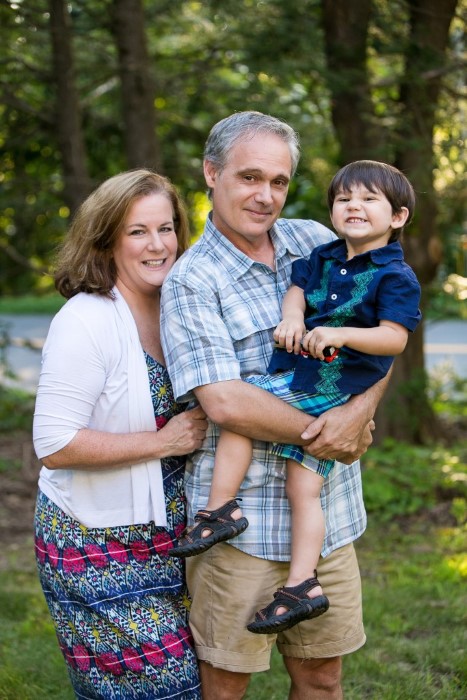
Contact Sally Cooney at grayhairedmom@gmail.com
@greyhairedmom on Twitter
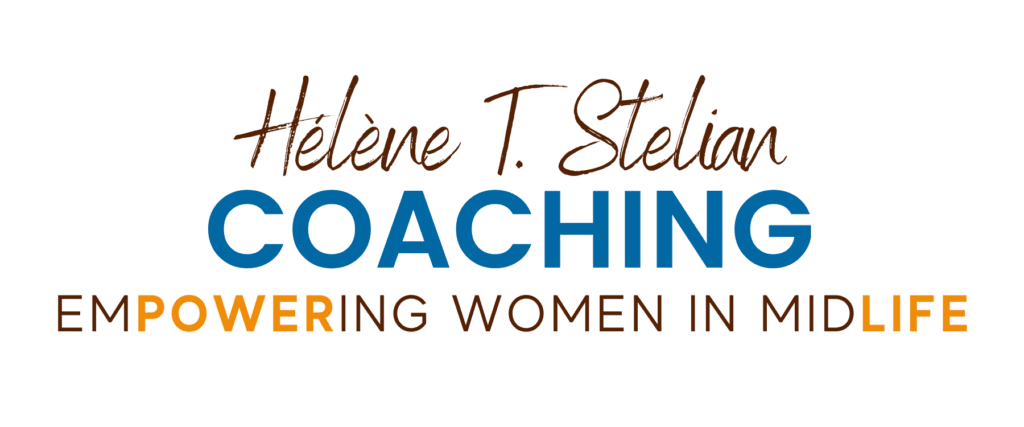
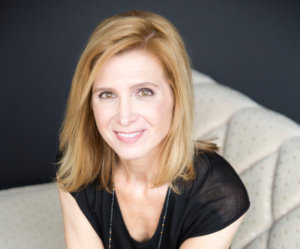
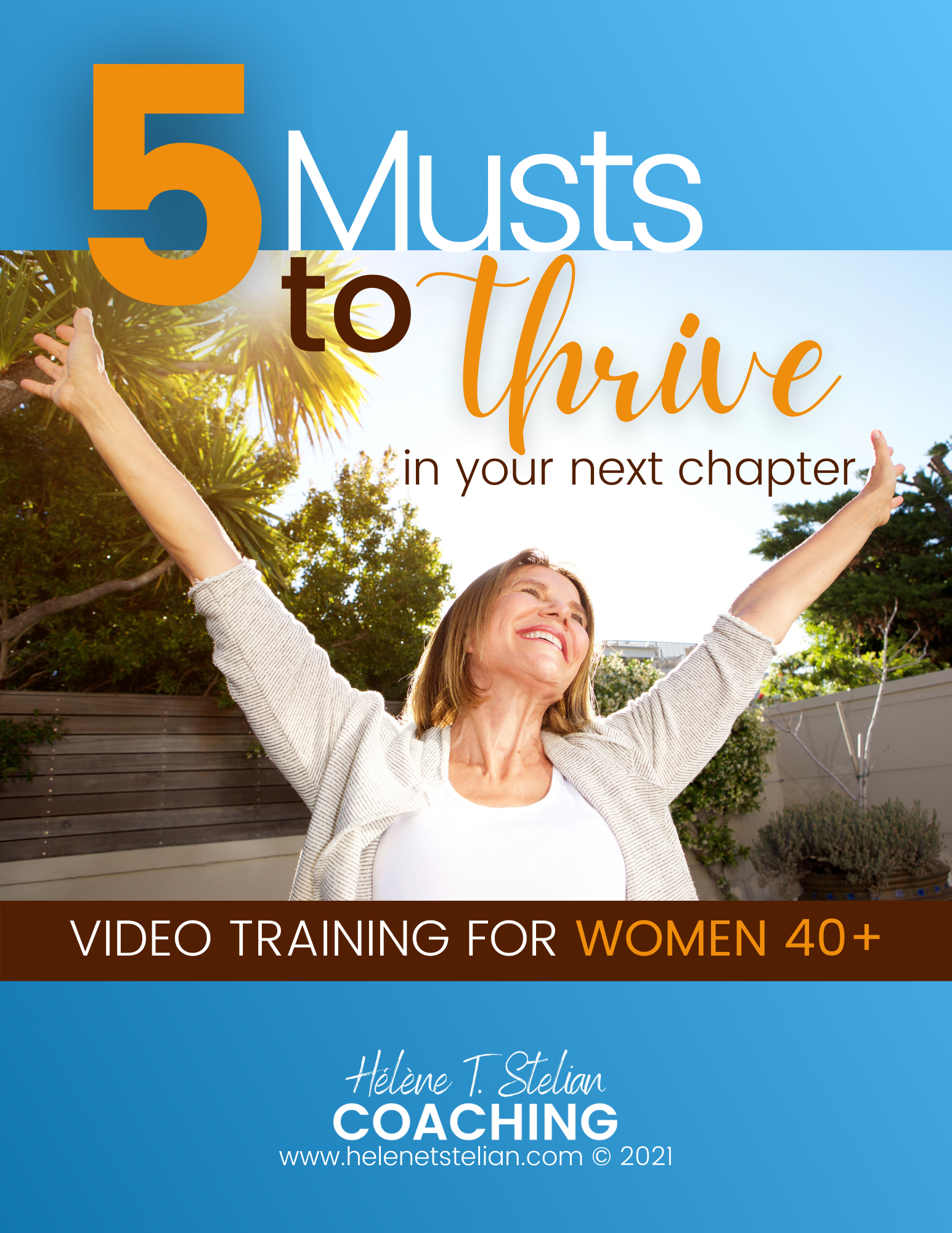



Wow! What a story…the hard questions are never resolved…agree. Also courage and love! What themes, what a family!
I think this is a great story! It’s difficult enough to be pregnant at a young age, let alone when you’re 51! I don’t blame Sally at all for not wanting to be far away from her neonatal unit after 24 weeks. I’m glad that everything worked out. Thanks for sharing!
I am glad to read such an informative post. I’d be more grateful whenever you post some more informational post here on your blog. I’ll better keep an eye for it. Thanks for sharing such a great post.
Like you said, having a choice between working on your career after having a child and not having one is valuable. It’s good you knew your career and lifestyle goals and had the room to make this essential decision.